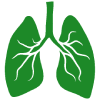Oral and Overall Wellness

Your oral health is vital for your overall wellbeing. This is because problems in your teeth, gums, tongue, and oral tissues can indicate underlying health issues in other parts of your body. Since your mouth serves as a gateway to your body, maintaining good oral health can have surprising positive effects on other areas of your health. Let's explore how oral health and overall wellness are interconnected.
What can your mouth tell you?
-
Hormones produced by stress and depression may contribute to gum disease.
-
Gum disease and poor oral health may lead to a higher risk for heart disease and stroke.
-
Bacteria in the mouth can be inhaled into the lungs and may lead to respiratory complications such as pneumonia.
-
There are links between kidney disease and oral health problems including gum disease and tooth loss.

-
Bone density tends to weaken with age, including the bones that support teeth.
-
Oral cancer can develop and easily spread throughout the body, so early detection is important.
-
Diabetic patients are more likely tp have gum disease. Non-diabetic patients with poor oral health may be more prone to developing diabetes.
The Connected Systems of Your Body
Think of your mouth as a doorway to the rest of your body. It's not just connected to your digestive system, but the oral tissues in your mouth (gums, tongue and cheeks) can introduce bacteria directly into your bloodstream. Yes, the same bacteria responsible for gum disease can cause inflammation in other parts of your body.
Conversely, health issues elsewhere in your body can weaken your body's ability to fight oral infections, increasing the risk of oral health problems. The complex connection between oral and overall health emphasizes the important role of prioritizing oral hygiene in a holistic healthcare approach.
Specific Examples of Health Connections
Here are just a few examples of how the health of your mouth may be associated with your overall health.
The relationship between diabetes and oral health is a complex, two-way street. Diabetes can negatively impact your oral health while poor oral health can make living with diabetes more challenging. Individuals with diabetes may be more susceptible to oral health issues such as gum disease (periodontitis) and tooth decay. The elevated blood sugar levels associated with diabetes create an environment conducive to bacterial growth in the mouth. This is often associated with a risk of infection and inflammation in the gums.
Conversely, oral health problems can complicate diabetes management. Diabetes may hinder the body's ability to combat infections, including those in the oral cavity. This interplay emphasizes the importance of individuals with diabetes to maintain strong oral hygiene habits and for them to seek regular dental care to manage both their systemic health and oral well-being effectively.
Here is a quick look at how diabetes can take a toll on your oral healthi:
-
1
You may have less salava,causing your mouth to feel dry.
-
2
Your gums may become inflamed and bleed often (signs of gum disease).
-
3
Infections in your mouth can take longer to heal.
Research has shown that individuals with poor oral hygiene, particularly those suffering from gum disease, face an elevated risk of developing heart-related conditions. According to the American Academy of Periodontology, individuals with gum disease face nearly double the risk of heart disease compared to those with healthy gums. Moreover, gum infection is more commonly found in individuals who experience a specific type of strokeii.
In a studyiii, researchers asked 682 people about their toothbrushing behavior.
After adjusting for various factors, they found that those who....

...did NOT brush their teeth 2 times a day for at least 2 minutes

had a three-fold increased risk of cardiovascular disease compared to those who said they brushed at least twice a day for at least two minutes.
The relationship between oral health and pregnancy is a critical consideration for maternal well-being and fetal development. The hormonal changes of pregnancy tend to increase the risk of gum disease and tooth decay. Moreover, studies have suggested a potential link between maternal periodontal health and adverse pregnancy outcomes, like preterm birth and low birth weightiv.
If you're pregnant or plan to become pregnant, it's crucial you maintain great oral hygiene by scheduling regular checkups and preventive care visits with your dentist. Collaborative efforts between expectant people, healthcare providers, and dental professionals can contribute to the oral and overall health of the parent and the child.

The connection between oral health and anxiety is profound and complex. Dealing with the social stigma around poor oral health and hygiene can lower your self-esteem and lead to feelings of stress and anxiety.
This can be a negative cycle, though, because stress can manifest itself physically in the form of teeth-grinding (bruxism), clenching, cold sores, and canker sores. Additionally, certain medications that treat depression and anxiety can also cause dry mouth, increasing the risk of tooth decayv.
Recognizing the two-way relationship between oral health and anxiety is crucial, as addressing both aspects together can promote better oral and mental well-being. Seeking professional support, practicing relaxation techniques, and maintaining regular dental check-ups can help mitigate anxiety and promote optimal oral health.

Behavior
Oral health habits- Current trends/data
It is essential that strong oral hygiene habits are incorporated into a daily routine. While many people have made a habit of brushing their teeth before bed, there is opportunity to improve when it comes to current trends related to oral health behavior. According to recent data, only 36% of adults reported using mouthwash once a dayv1. Similarly, flossing, an essential component of oral hygiene, appears to be even less prevalent, with only 31% of adults reporting daily flossing habits. These figures underscore the need for increased awareness and emphasis on comprehensive oral care routines, including regular use of mouthwash and consistent flossing, to ensure the best possible oral health outcomes for individuals.
The percentage of adults who keep up with recommended brushing, mouthwash, and flossing usage standards

79%
brushed their teeth twice a day

36%
used mouthwash once a day

3%
flossed once a day
Recommended best practices
Now is the perfect time to refresh your oral health regimen. Here are a few best practices to incorporate into your daily life to prioritize your oral health.
- Brush teeth at least twice a day with fluoride toothpaste
- Use dental floss to clean between teeth and along the gumline
- Incorporate mouthwash into your routine to reduce plaque buildup and fight bacteria
- Maintain a balanced diet rich in fruits, vegetables, and calcium
- Avoid tobacco products
- Avoid alcohol
- Limit consumption of sugary snacks and beverages
And remember: prevention goes beyond just your home habits. Make sure to see your dentist regularly and utilize your preventive dental benefits. These visits not only help maintain healthy teeth and gums but also play a crucial role in early detection and prevention of dental issues. During routine check-ups, dentists can identify potential problems such as cavities, gum disease, or oral cancer, allowing for prompt treatment before they escalate into more serious conditions. In a recent study, approximately 4 in 5 adults who maintained regular dental office visits said they did not require unexpected care in the futurevii. Professional cleanings remove plaque and tartar buildup that cannot be effectively removed through at-home oral hygiene practices, reducing the risk of tooth decay and gum disease. Additionally, dentists can provide personalized advice on proper oral hygiene techniques and lifestyle habits to optimize your oral health. By investing in preventive dental care, individuals can safeguard their smiles and contribute to better overall health and well-being.
Regular preventive dental visits are crucial for maintaining good oral health
The results are clear, as approximately 4 in 5 adults (81%) who maintained regular dental office visits said they did not require unexpected care in the future.

Whether it's diabetes, heart disease, pregnancy, anxiety, or other health concerns, our mouths offer valuable insights into our overall well-being. But here's the good news: by simply incorporating daily habits like brushing, flossing, and rinsing with mouthwash, alongside a balanced diet and regular dental check-ups, we hold the power to transform our smiles and safeguard our health.
Remember, preventive dental care isn't just about avoiding problems; it's about embracing a proactive approach to our health. So let's continue to prioritize our oral health, schedule those regular dental check-ups, and smile knowing that we're investing in a happier, healthier tomorrow. If you're in need of a dentist, you can easily find one using Delta Dental of Washington's "Find a Dentist" tool.
Check out other blogs to learn more about the connection between oral and overall health.
Looking for benefits?
If you have over 50 employees, please contact your broker to learn more.
Sources
- CDC. "Diabetes & Oral Health." Accessed at: https://www.cdc.gov/diabetes/managing/diabetes-oral-health.html
- Delta Dental. "Oral Health & Your Heart." Accessed at: https://www.deltadental.com/us/en/protect-my-smile/overall-health/oral-health-your-heart.html
- American Heart Association. "Bad Tooth-Brushing Habits Tied to Higher Heart Risk." Accessed at: https://www.heart.org/en/news/2018/11/07/bad-tooth-brushing-habits-tied-to-higher-heart-risk
- Harvard T.H. Chan School of Public Health. "Oral Health." Accessed at: https://www.hsph.harvard.edu/nutritionsource/oral-health/
- Delta Dental. "State of America's Oral Health Report." Accessed at: https://www.deltadental.com/us/en/state-of-americas-oral-health-report.html














